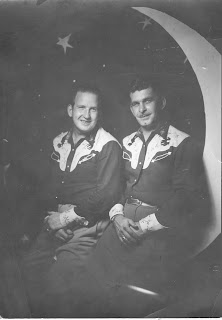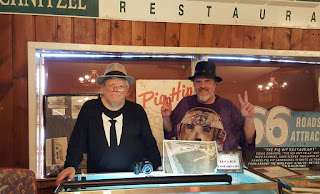Death on Route 66: The Murders of Gene Reed and Martin Drenovac - Part One
(First published in Show Me Route 66, Vol. 23 No. 3, 2013
Second published in Prairie Land Buzz, January 2014)
In 1961, two AWOL Texas GIs went on
a cross-country killing spree from Florida to Colorado, killing seven
people in a two-week orgy of robbery, violence, and murder. Their
travels brought James Douglas Latham, 19, and George Ronald York, 18,
Illinois' Metro East, where they made several tragic stops. Their
senseless, brutal slayings of Albert Eugene “Gene” Reed and
Martin Drenovac along Route 66 sent the Illinois communities of
Litchfield, Edwardsville, and Mitchell/Granite City reeling. Reed and
Drenovac were victims #4 and #5 respectively of nine victims
assaulted (seven of which died) at the hands of Latham and York from
May 26 through June 10, 1961.
Stationed at Fort Hood, Texas, Latham
and York each seemed to have a large chip on his shoulder and a big
nose for trouble. As a result of theft and AWOL charges, both were
serving terms in the stockade when they walked away in May of 1961.
The soldiers were evidently determined to make someone pay for their
troubles. They later claimed that being placed in a mixed-race unit
in the army was the catalyst for their hatred and violence.
At New Roads, Louisiana, on May 27, the
pair attacked Edward J. Guidroz, a 43-year-old fish peddler, with a
wrench, leaving him for dead. (Apparently York and Latham thought
that they had killed Guidroz. When apprehended, they had eight
notches carved on a revolver, indicating eight killings. Seven of
their victims were actually killed, Guidroz recovered, and another
one got away.) The pair took Guidroz' money and pickup truck and
headed for Jacksonville, Florida, York's home town.
In Florida on May 29, they strangled
two women from Valdosta, Georgia, Patricia Ann Hewitt, 25, and Althea
Ottavio, 44, and helped themselves to a .38 pistol from their car and
their winnings from the dog races at Jacksonville. Next, near Aiken,
South Carolina, the pair shot several times at a man in a Cadillac,
but he got away. York and Latham arrived in the Tullahoma, Tennessee,
area on or about Wednesday, June 7. There they encountered John
Whittaker, an elderly porter for the Louisville and Nashville
Railroad. They shot and killed the 71-year old man.
During the night or early morning on
June 7 or 8, York and Latham arrived in Madison County, Illinois. At
some point they abandoned Whittaker's car near Troy and laid in wait
for their next victim – someone with an automobile, of course,
maybe even a late-model one.
And “Gene” Reed had one – a 1961
red four-door Dodge Dart. Family members recall that Gene bought that
vehicle at Hittmeier Brothers' auto dealership on old Route 66.
Long-time Litchfield residents remember Reed as a good-looking man
with wavy black hair and a pencil-thin mustache. He was known as a
“cowboy guitarist” and played at area venues including the Log
Cabin in Taylor Springs and the Moose Club in Carlinville. He also
performed on local radio station WSMI and was a member of the local
musicians' union. Gene's daughter Jackie Reed Street remembers that
her dad “worked all week” and “played [music] every weekend.”
He played guitar, accordion, and saxophone.
Gene worked in the communications
department for the Gulf, Mobile & Ohio Railroad at their Venice
location. He had gained experience in communications while serving
three years in the navy in the South Pacific. The World War II
veteran was a member of the local VFW post.
Gene and his second wife, the former
Martha Jane Clark, lived with their two young children, Jean Marie
and Albert Eugene Jr., in an apartment at 320 ½ East Columbia Street
in Litchfield. Married in 1954, Martha was pregnant with their third
child. Gene also had two children, Gerald and Jacqueline “Jackie,”
by his first wife, Vivian Darrah.
 |
| Gene Reed and his first wife, Vivien Darrah Reed, were captured in this late 1940s picture at their home in Butler, Illinois. Courtesy of Jackie Reed Street. |
On Thursday morning, June 8, Gene
dressed for work in a striped short-sleeve shirt, green work pants,
and a pair of chukka boots. As he left their apartment about 6:45 am,
his wife Martha gave him her usual reminder not to pick up
hitchhikers. The tank of his Dodge was low on gas, but he had a litte
cash with him and there were plenty of gas stations along his route.
Near Troy, Gene spotted a couple hitchhikers and stopped. Gene never
arrived for his 8:00 o'clock shift at Gulf, Mobile & Ohio
Railroad.
York and Latham, driving Gene's Dodge,
pulled off Bypass 66 onto some low farmland at the foot of Sunset
Hill, southwest of Edwardsville. There, they pulled Gene Reed's body
from his own car and left it in a creek. He had been shot through the
head with a .38 caliber, near his left ear. The killers left Gene's
two rings on his fingers and his watch on his wrist and left behind
his empty wallet, but the .22 caliber handgun from his glove
compartment was gone. The stolen Dodge with its new occupants headed
west. Their next stop, a few minutes down the road, would be at
Mitchell – for gas and money.
About 2:15 that afternoon, Gerald
Chapman Sr., who lived in a farm house near the bottom of Sunset
Hill, was on his way home from work. He told the Edwardsville
Intelligencer that he had the habit of driving onto a wooden
bridge to check the creek level after a rain. That day he spotted
something – or someone – in the creek and feared it might be his
nine-year-old son Gerald. The father leaped out of his car without
taking it out of gear. The car rolled forward another 25 feet before
coming to rest in a field.
It was not his son in the creek – it
was Gene Reed, someone else's son, brother, and father. The crime
scene was on a private road just southwest of the intersection of
Bypass 66 and Route 157 and state troopers and county officials soon
arrived. Papers in Reed's wallet provided identification which was
verified that night by his brothers. Witnesses, including neighbors
and a truckdriver, spoke to law enforcement officers and described
cars they had seen in the vicinity. Madison County Sheriff George
Musso was quoted as saying that there “was apparently no connection
between the Reed slaying and a fatal holdup and beating near the
Chain of Rocks Bridge” that same morning.
Gene Reed's funeral was held at the
Carroll Funeral Home in Litchfield the following Sunday. He was
buried in Sunnyside Cemetery at Sorento, where he had formerly lived.
Besides his wife and four children, he left his mother, Mrs. Virginia
Sloan Reed, and three brothers, Bill, Roland, and Jerry, and a
sister, Mrs. Glen Deffenbaugh. His fifth child was born shortly after
his death.
In the next post, follow York and
Latham's route from the Edwardsville area to Mitchell, where their
fifth victim was unknowingly waiting in their path at the Twin Oaks
Gas for Less Hiway 66 service station.






Comments
Post a Comment